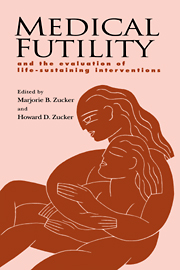Book contents
- Frontmatter
- Contents
- Preface
- Foreword
- Contributors
- 1 Medical futility: a useful concept?
- 2 Death with dignity?
- 3 Physicians and medical futility: experience in the critical care setting
- 4 Physicians and medical futility: experience in the setting of general medical care
- 5 Futility issues in pediatrics
- 6 Medical futility: a nursing home perspective
- 7 Alternative medicine and medical futility
- 8 How culture and religion affect attitudes toward medical futility
- 9 When religious beliefs and medical judgments conflict: civic polity and the social good
- 10 Conflict resolution: experience of consultation-liaison psychiatrists
- 11 Ethics committees and end-of-life decision making
- 12 The economics of futile interventions
- 13 Medical futility: a legal perspective
- 14 Professional and public community projects for developing medical futility guidelines
- 15 Community futility policies: the illusion of consensus?
- 16 Not quite the last word: scenarios and solutions
- Index of cited authors, cases, and statutes
- Subject index
7 - Alternative medicine and medical futility
Published online by Cambridge University Press: 11 September 2009
- Frontmatter
- Contents
- Preface
- Foreword
- Contributors
- 1 Medical futility: a useful concept?
- 2 Death with dignity?
- 3 Physicians and medical futility: experience in the critical care setting
- 4 Physicians and medical futility: experience in the setting of general medical care
- 5 Futility issues in pediatrics
- 6 Medical futility: a nursing home perspective
- 7 Alternative medicine and medical futility
- 8 How culture and religion affect attitudes toward medical futility
- 9 When religious beliefs and medical judgments conflict: civic polity and the social good
- 10 Conflict resolution: experience of consultation-liaison psychiatrists
- 11 Ethics committees and end-of-life decision making
- 12 The economics of futile interventions
- 13 Medical futility: a legal perspective
- 14 Professional and public community projects for developing medical futility guidelines
- 15 Community futility policies: the illusion of consensus?
- 16 Not quite the last word: scenarios and solutions
- Index of cited authors, cases, and statutes
- Subject index
Summary
He who conceals his disease cannot expect to be cured.
(Ethiopian proverb)Many of us, especially those of us trained in modern medicine, believe in the primacy of science and its ability to find a cure for what ails us. That belief is shaken by the prevalence of chronic or recurrent debilitating diseases and by death itself. The wish for something now and for something more effective than what science offers leads in the direction of alternative medicine. Uncertainty as to what is effective is heightened by the fact that many conditions other than terminal illness have a psychologic component and may be improved by alternative therapy; low back pain and insomnia are good examples.
Eisenberg et al. (1993) defined alternative medicine as “medical interventions not widely taught at U.S. medical schools or generally available at U.S. hospitals.” Cassileth et al. (1984) found that cancer patients who used alternative treatments were better educated than patients who used only conventional therapy. These authors concluded that there was a selective bias toward educated patients because they have the financial, educational, and personal resources to learn about these therapies and to provide support for their families during this time. Lerner and Kennedy (1992) reported similar characteristics. The better educated have also been taught not to take authority at face value.
- Type
- Chapter
- Information
- Medical FutilityAnd the Evaluation of Life-Sustaining Interventions, pp. 65 - 70Publisher: Cambridge University PressPrint publication year: 1997



